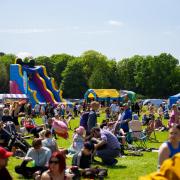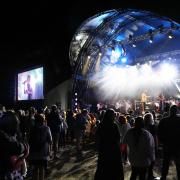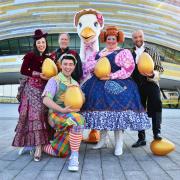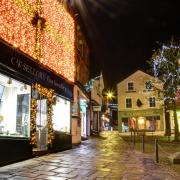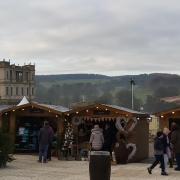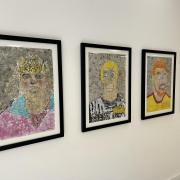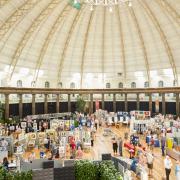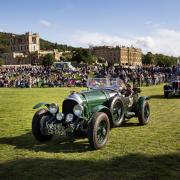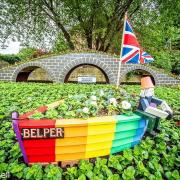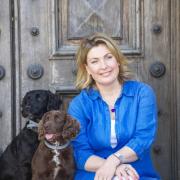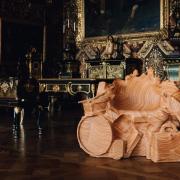The Society marks its anniversary in a return to its roots with a Farm to Plate day

The Bakewell Agricultural and Horticultural Society celebrated its 200th anniversary this year, marking the occasion with a celebration dinner at Chatsworth hosted by the Duchess of Devonshire, this year's Society President. The Society has also sought to re-establish itself with its founding roots to ensure future sustainability.
One of the oldest agricultural societies in the UK, the Society was formed in 1819 to support agriculture, horticulture and foresty, which was suffering following the very expensive Napoleonic Wars. Today it is best known though for organising the Bakewell Show.
Two hundred years ago Wootten Thomas, a well-known Chesterfield lawyer of his day, organised the first meeting. He was concerned about the state of British farming and wanted Parliament to impose taxes on imported produce - an idea favoured by a growing number of agricultural societies that were being set up at around the same time. The meeting, attended by 12 landowners and farmers, took place on 3rd April 1819 at the Angel Inn in Chesterfield and so The Scarsdale and High Peak Agricultural Society - as it was then known - was formed.
The first one-day show event was held on a field next to the Angel Inn and then alternated initially between there and the grounds of the Rutland Arms at Bakewell. The first show, though admittedly small, was organised in less than three months, which is quite different to the planning involved in more recent years when some aspects - such as catering and marquee hire - are confirmed up to three years in advance. Since 1926 the Bakewell Show has taken place on what is now known as the Showground in Bakewell and, due to its increasing popularity, was turned into a two-day event in 1980.

In its long history, the Bakewell Show has only ever been cancelled as a result of wars and once following an outbreak of swine fever. However, with the 2017 show came torrential rains that saw the ground severely damaged. Linda Robbins, one of the Society's five Directors says, '2017 was an absolute nightmare of a show. It poured with rain and the showground flooded leaving it in really bad condition.' Indeed, it was in such a poor state that the Society decided not to organise a show the following year in order to allow the ground to recover and to carry out some much-needed maintenance work. This included completely reseeding the centre ring and reinforcing some of the other grassed areas, particularly those used by vehicles. This involved removing the turf to add in stone aggregate before replanting it.
Allowing the ground to recover also gave the organisers the time and opportunity to reassess the direction of the Society. Linda says, 'With this year off we were given space to rethink the type of show we wanted, which was a smaller, more traditional, farming and family focused show that reflected why the Society was set up. In recent years we had become bound by commercial pressures and expanded into areas we wouldn't have normally.' With visitor numbers dropping across the whole of the show industry, the organisers decided to go back to basics with the creation of 'Farm to Plate'.
This new one day family event took place on the last Sunday in June. Not only did it aim to raise awareness of where food comes from but was designed to be a fun day out for all. Animals on show included various breeds of sheep and cattle with the opportunity for visitors to learn more about them. A display of heavy horses demonstrated how these former stalwarts of the farming industry would have been used by farmers in bygone years - such as pulling ploughs and bringing in the harvest. Then, in memory of Samuel Wilson who used to attend the Bakewell Show with his vintage farm machinery in the 1950s and 60s, one of his relatives, Martin Ambrey, recreated his original exhibitions.
The Cookery Theatre featured top local chefs and cookery demonstrations. The Lecture Theatre had various talks and workshops taking place throughout the day including Thornbridge Hall providing beer and cheese tastings and Matlock Meadows Farm talking about how they had diversified by setting up their own ice cream business. In the 'How To' arena, there were demonstrations of lathe turning, furniture making, spinning and weaving, and besom broom making where children could make their own out of heather to take home. The marquee proved so popular that Linda says they could have doubled the size. Elsewhere there were demonstrations of survival crafts, chainsaw wood sculpting and dry stone walling. Indeed, one visitor was so impressed that he invited James Eyre, a dry stone waller, to do some dry stone walling for him at his home in America!

However, just like the event only two years previously, the Show couldn't escape the elements. Linda says, 'At 9.30pm on the evening before the event an almighty wind came gusting down the valley wiping out our gazebos. We spent time in various garages looking at what we'd got to replace them - but we managed it fine!' she smiles. In contrast, the following day brought with it perfect weather and an event that was deemed a success. Linda says, 'We did what we intended to do, which was to have a happy, friendly day, which everyone enjoyed. There was a lovely atmosphere. The farmers and the people of Bakewell were most pleased with what we'd done and we scored with families too. Some parents even had to take their children home crying because they didn't want to leave!'
Creating a show that was much more family orientated was important. Linda says, 'With Farm to Plate we wanted to demonstrate the importance of continuity. We don't know what's going to happen after Brexit so we have got to become more self-sufficient. The next generation will play a huge part in this but young people are not going into farming in the same way as they were. We need to engage the next generation and there is a good chance we can if we can educate them about where food comes from.'
In addition to Farm to Plate the Society is organising events to support the rural community. Supported by the Society's five board members, two part time staff and dedicated volunteers, these events will involve competitions to include cheese and meat products, as well as standalone shows for horticulture - timed to fit in with the main crop ripening season - as well as horse and dog shows. Additionally the Society is keen to introduce a bursary programme to help farmers as well as supporting the wider rural community through increased lobbying. The Show office also rents out the Showground to third party events including September's Peakender Beer Festival, dog agility shows and car boot sales.
200 years after the formation of the Bakewell Agricultural and Horticultural Society, 'Farm to Plate' has seen it return to its roots as it looks forward to supporting new generations of farmers and the rural community.




